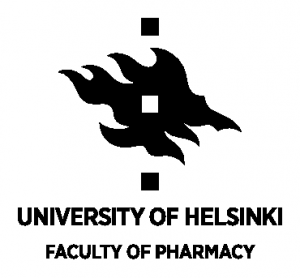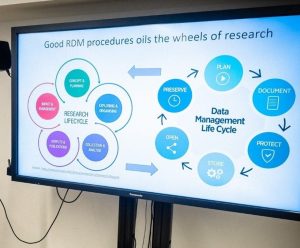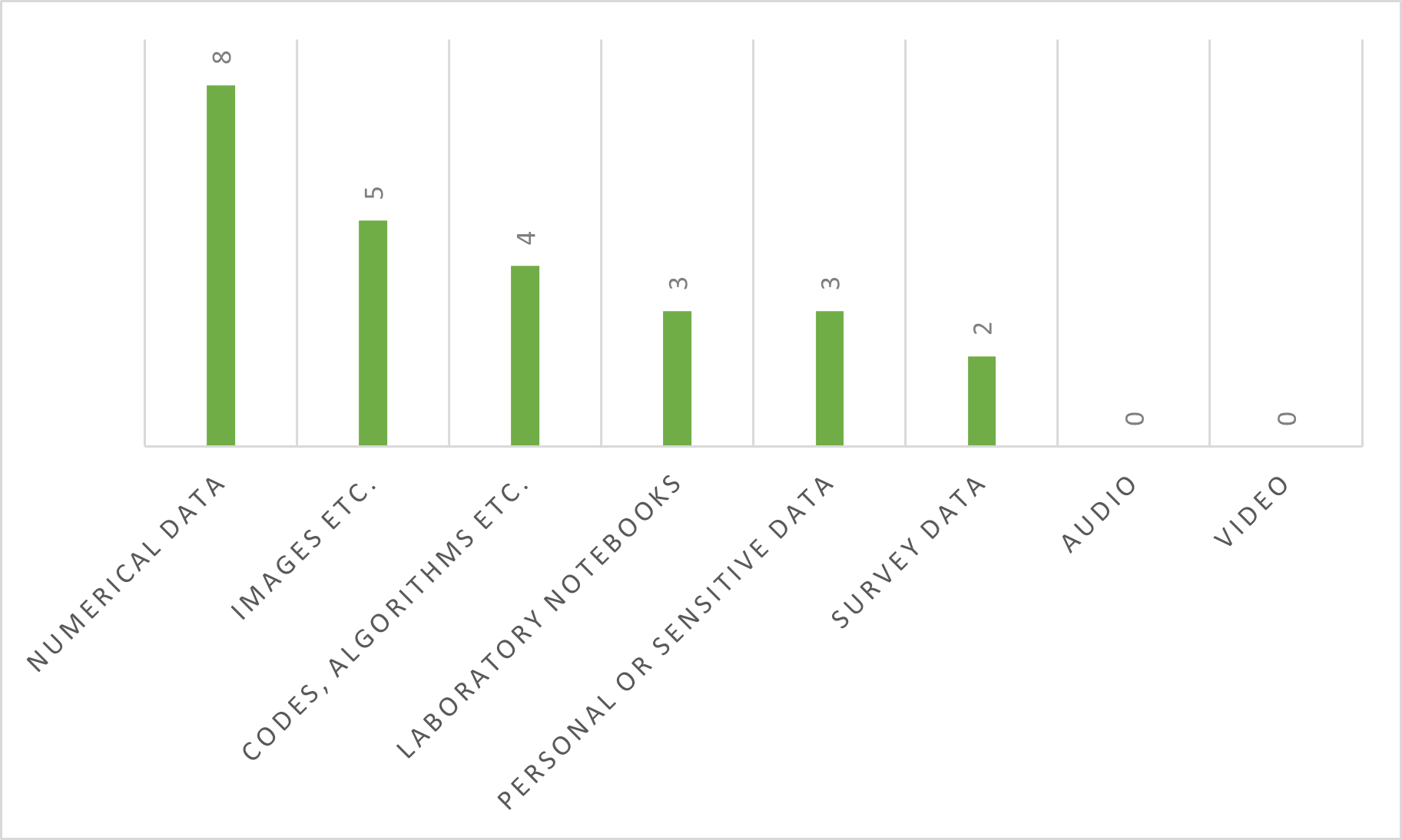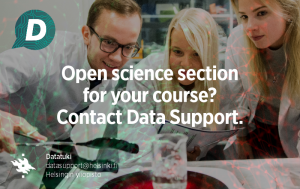How to make the practices of research data management (RDM) and open access publishing familiar to undergraduate students? In the fall of 2022, the Faculty of Pharmacy and the Helsinki University Library implemented a collaborative project in which the teaching of open science practices were included in the master’s students’ course. This blog article describes how the teaching was carried out and what was learned from it. After a successful pilot project, it is possible to offer similar training in other disciplines as well.
(Tämä artikkeli on saatavissa myös suomeksi.)
Text: Ursula Virolainen (Helsinki University Library)
 Research orientation is part of the new Master’s programme in pharmaceutical research, development and safety at the University of Helsinki Faculty of Pharmacy. The programme was launched in autumn 2022. This blog article shows how open science can be made known to master’s students already during the orientation phase.
Research orientation is part of the new Master’s programme in pharmaceutical research, development and safety at the University of Helsinki Faculty of Pharmacy. The programme was launched in autumn 2022. This blog article shows how open science can be made known to master’s students already during the orientation phase.
The cooperation between the Faculty of Pharmacy and the library started in late 2021, when Leena Hanski, senior lecturer in charge of the Research orientation course, contacted the University of Helsinki Data Support. From the library, the cooperation was joined by information specialists Anne Ojanen (lecture on open science and publishing) and Iina Hepolehto (data management lecture). Päivi Helminen, Tuija Korhonen and trainee Jingsi Wu were also involved in the planning of the library part.
The data support experts saw this as a good opportunity to tailor the teaching of data management more to the undergraduate level, which could also be used in the future.
The original idea was that students would attend an existing Research data management basics (RDM) course to get a basic understanding of data management. However, as the number of students was expected to be closer to twenty, the library’s data support team agreed to tailor separate lectures to suit the needs of the students. At this stage, Data Support also proposed an open access section to complement the package. At the same time, the data support experts saw this as a good opportunity to tailor the teaching of data management more to the undergraduate level, which could also be used in the future. The RDM basics lecture material, which is already available for training purposes, was designed with more doctoral researchers and more experienced academics in mind.
How did we implement an open science package?
 The open science component of the Research orientation course consisted of two lectures that dealt with open science, open access publishing and research data management. The lecture on open science and publishing consisted of three sections which were outlined in a meeting between the librarians and the the pharmacy liaison teacher.
The open science component of the Research orientation course consisted of two lectures that dealt with open science, open access publishing and research data management. The lecture on open science and publishing consisted of three sections which were outlined in a meeting between the librarians and the the pharmacy liaison teacher.
The lectures were structured as a whole, starting with a brief overview of open science. This was followed by a discussion of open access publications, particularly from the point of view of information retrieval and further use. Finally, the principles of open access and the open access services offered by the University of Helsinki, such as the co-storage service and the support for publication fees (for more information on these services, see Open science and research services) were presented.
The RDM lecture went through the concepts and principles of data management, for example, what is meant by data in RDM. The lecture also covered how data is categorised and how to handle personal and sensitive data. In terms of documentation, the lecture aimed to be as concrete as possible. For example, the lecture covered the following issues:
- How to systematically name the files?
- How to organise research data?
- What kind of things need to be documented about the dataset?
- How to open research data?
- How to find suitable data repositories?
- How to refer responsibly to the research data of others?
A pre-assignment was also prepared for each lecture. The assignment for the open science lecture was to learn about the Directory of Open Access database (DOAJ). The task was to assess the openness of the article of their own host research group and to check whether the article under review had a license such as CC BY. In the data management section, the pre-task was to familiarize themselves with the data of their own host research group by using the help questions and by interviewing a member of the research group.

What kind of feedback did we get and what did we learn?
The course leaders added a separate question to the University of Helsinki’s Norppa feedback form about the open science and data management sections.
”This section received good feedback from the students. Most of them found the content very useful”, Leena Hanski says.
”From the teacher’s point of view, it was also very positive that the library was prepared to invest in planning the teaching and to consider in good time the content and implementation methods relevant for master’s students”, Hanski adds.
Another key idea behind the course was to give students an on-site experience of the work of the different research groups. In this way, different approaches to open science become familiar in different ways:
”It is not necessarily easy to grasp the concept of material or data at the beginning of a master’s degree course, but in this context, the students were able to get a very concrete answer to this question by finding out what kind of data is created and used in their own research group.”
It is not necessarily easy to grasp the concept of material or data at the beginning of a master’s degree course, but in this context, the students were able to get a very concrete answer to this question by finding out what kind of data is created and used in their own research group.
”Many students said that the preliminary assignment had helped them to put things into concrete terms and that this teaching had given them good background information before they started their Master’s thesis. The themes of open science will also be covered later in the compulsory research ethics course in our Master’s programme, so it’s a good idea to get to know it as a phenomenon early on in your studies”, Hanski continues.
The library was also very satisfied with the overall success of open science and data management, but there are also areas for improvement.
”Compiling a lecture on open science for master’s students is something that needs a lot of thought. I think there may have been too much for one lecture. It would be good to have more people involved in the further development of the section, preferably including students”, Anne Ojanen says.
”I got some good tips on how to compose the course assignments, such as the fact that they should be suitable for someone who is familiar with the subject. One’s own expertise can very well distort the picture of what kind of assignment a student can undertake when the subject is completely new. Our trainee, Jingsi, tested the tasks through, and commented on the preliminary tasks designed on that basis. This was a great help and benefit”, Iina Hepolehto reflects.
What kind of future plans have you made for the course?
”The slides and content of the data management lecture are planned to be further refined by the data team so that the learning material could be made openly available for free use by university teachers. Originally, the idea behind the pre-activating tasks was that they would be composed in such a way that students from almost any discipline could complete the tasks by consulting current articles in their field”, Anne Ojanen and Iina Hepolehto explain.
The slides and content of the data management lecture are planned to be further refined by the data team so that the learning material could be made openly available for free use by university teachers.
The cooperation seems to be successful and fruitful. For the future, it may also be necessary to consider what kind of training in responsible or ethical science is already available in the different faculties and curricula and to link this with the content available in the library. According to the report of a survey of data management training (Survey of the Finnish Research Data Management (RDM) training 2020–2021, Kanerva et al., 2022), there is still room for improvement in data management skills in higher education.
Does your course cover open science issues? Are you interested in a similar collaboration with the University of Helsinki Library? Please contact the University’s Data Support: datasupport@helsinki.fi.

